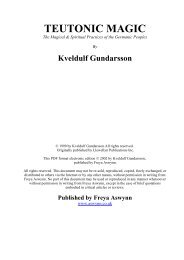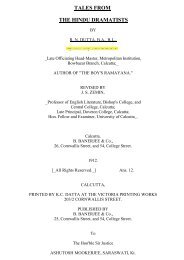Untitled - Awaken Video
Untitled - Awaken Video
Untitled - Awaken Video
You also want an ePaper? Increase the reach of your titles
YUMPU automatically turns print PDFs into web optimized ePapers that Google loves.
Chapter 6. The Sky 161<br />
a kingdom. The individual indeed may have enjoyed certain privileges provided by<br />
the God whom he represented but in terms that would benefit the entire community<br />
in short and the overall functioning of the World Tree in the long run.<br />
Again the ancient Germanic view of individuality resurfaces. A person was an<br />
individual only as he or she fit into a lineage, a family, a community, a nation,<br />
Midgard and, finally, the Tree itself like a series of concentric circles with the center<br />
being the realm of personal experience or the point from which perception originated.<br />
Each had roles and responsibilities to play out within each of the circles. The “force”<br />
of an act diminished the further from the point of the act’s origin with the effects<br />
of the most powerful lineages being felt in ever wider circles (see Chap. 2). The<br />
relationship between an individual and a God, then, was from the very center of a<br />
set of these concentric circles to the outermost circle, and, like throwing a rock into<br />
the center of a lake, for the reverberation of an individual to be felt by the Gods, an<br />
act would have had to have been very powerful indeed with perhaps only the acts<br />
of kings, powerful leaders, and great warriors or entire communities being the most<br />
effective.<br />
There are many speculations by scholars as to why Christianity was accepted<br />
in northern Europe, and many of them have been mentioned to some degree in<br />
the preceding chapters. None of the theories cover all the bases, but they all have<br />
one thing in common: Christianity offered a way for the status of an individual to<br />
be raised to its highest possible level. No longer did a person have to suffer the<br />
supposed indignity of being an insignificant cog/ individual within the workings of<br />
a very large machine/ community; he or she could have a direct line of access to the<br />
widest of the concentric circles but only by accepting the White Christ. In essence,<br />
by accepting the new God, even thralls (slaves) could view themselves on par with<br />
kings.<br />
Christianity had something to offer to everyone. It did not acknowledge slavery,<br />
so in Christian eyes at least slaves were essentially freed men. The large population<br />
of peasants (bonded servants) were offered individual salvation. Kings were offered<br />
political power which through alliances with other Christian kings increased their<br />
political influence from being the king of a small regional kingdom to something<br />
more akin to an emperor. Even though Christianity was supposed to be primarily<br />
a spiritual movement,<br />
“it is likely that political as well as religious considerations were significant<br />
in determining whether a leader received Christianity and whether he could<br />
induce his followers to agree. Cnut the Great is an obvious example of a<br />
great Viking ruler who recognized that political success would depend on his
















